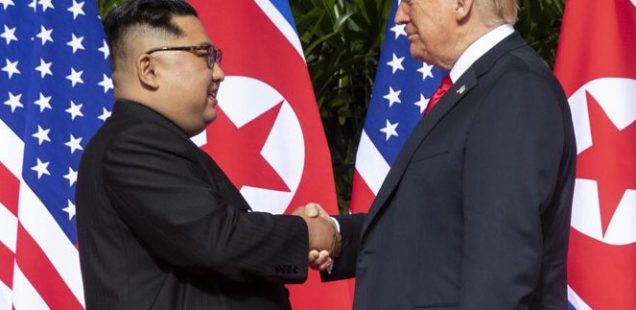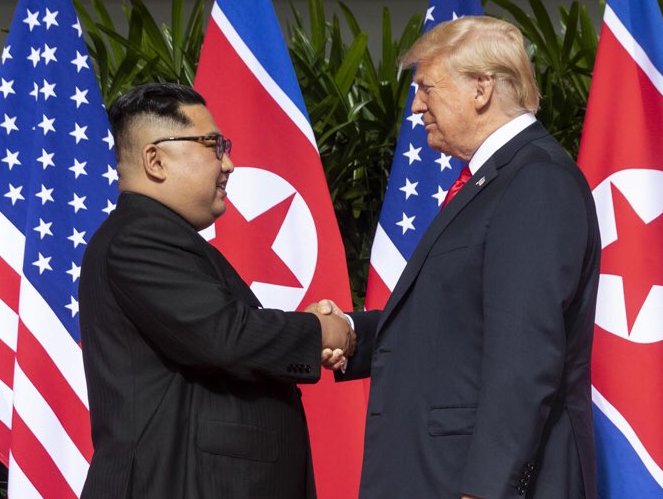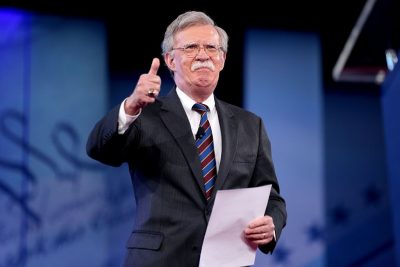
The Trump Administration’s Spoiler Foreign Policy
U.S. strategy abroad is assuming a curious shape. Whether the president or his minders are running affairs, Patrick Lawrence sees the U.S. being reduced to playing a spoiler role in the Middle East and Northeast Asia.
It is not possible to speak of “Donald Trump’s foreign policy” for the simple reason one can never tell whether the president or his minders are running it. Contradictions, reversals, and turns-on-a-dime have abounded since Trump took office.
But this administration’s strategy abroad has assumed a discernible shape in recent weeks, whoever may be managing it in any given context. Never mind “not a pretty picture.” This is a shameful picture.
Consider these recent developments. Have you lost track of how many sets of sanctions Washington has imposed on Russia? I have. Last week, the Treasury Department added four Russian companies and two Russian citizens to its lengthy list of sanctioned entities—these for allegedly circumventing United States sanctions and (in two cases) United Nations sanctions barring oil shipments to North Korea. More are on the way, to judge by deliberations on Capitol Hill. At this point, it is difficult to avoid the conclusion that the U.S. objective is to strangle the Russian economy.
The Trump administration has mounted a maximum-pressure campaign on Europe, and especially Germany, to follow the U.S.-U.K. lead in developing a more hostile posture toward Russia, even if it hurts European, and especially German, interests. Prior to Angela Merkel’s summit with Vladimir Putin last weekend, Washington strongly urged the German chancellor to scuttle a Russia-to-Europe gas pipeline known as Nord Stream 2. Washington now threatens sanctions—as early as this autumn—against any European companies investing in the project.
The bizarre reversals are especially apparent on North Korea. Recall that the July summit was on-again and off-again. Last Friday, the White House canceled a trip to Pyongyang that Mike Pompeo had scheduled for this week. It would have been the secretary of state’s third visit. Trump’s complaint was that North Korea is “not making sufficient progress toward denuclearization.” He then went on the blame China for easing pressure it had formerly applied to the North. But he also sent “warmest regards” to Kim Jong Un, the North Korean leader, and added, “I look forward to seeing him soon.” This is a hard read. It may be a matter of Trump keeping the klieg lights focused on Trump, although the fundamental intent of Trump’s minders remains scuttling any accord that brings peace to Northeast Asia.
Syrian Shuffle

Trump and Kim: Best friends forever. (Dan Scavino Jr. / Wikimedia)
In Syria too, Trump says one thing and another thing seems to happen. In much-publicized remarks in April, Trump said U.S. special forces would be pulled from the country. They are still there, and it’s not clear whether the U.S. is winding down or ramping up.
Two weeks ago, the administration dropped plans to spend $230 million on reparation projects to help stabilize Syria. These funds were to have gone to fixing water systems, clearing rubble and removing unexploded mines. Note, however: The U.S. intended to spend this money in areas still controlled by anti–Damascus militias. Pulling the funds looks like an admission of defeat, but indications are it is not quite a surrender.
The Russian Defense Ministry warned all last week of another false-flag gas attack—this one in Idlib, where the last 70,000 anti-Damascus militias are holding out. This is not the first time the Russian military has detected such plans. Itwarned of the attack in Douma, the besieged Damascus suburb, weeks before it occurred in April. Over the weekend, John Bolton, Trump’s national security adviser, countered that Washington has information that Damascus plans a chemical attack in Idlib.
Try me for treason. I believe the Russian intelligence, not Bolton. In the Douma case and now in Idlib, Moscow produced evidence implicating the White Helmets, the notoriously fraudulent “civic aid” group that is partly funded by the U.S. even as it maintains ties to jihadist militias. Bolton, as is the American habit these days, offered no evidence for his claim. We will have to see what transpires. Moscow predicts an attack in the next few days.
Remaining in the funds-cutting column, the administration announced last Friday that it would eliminate more than $200 million in Palestinian aid to the West Bank and Gaza. These are small reductions in the administration’s plans to cut the foreign-aid budget by up to $3 billion.
‘Round the World Muddle
Russia, Asia, the Middle East, Europe. The above list covers a great deal of the planet. What do we surmise from it? A brief review of events in each region will help us toward an answer.
To begin with, the argument that North Korea has taken no significant steps toward denuclearization collapses when subject to even the most superficial scrutiny. Pyongyang has pledged to stop all nuclear and missile tests and has conducted none since the Kim-Trump summit in May. It has destroyed its principal nuclear-testing facility and decommissioned a key missile-engine manufacturing plant. It has returned the remains of some U.S. soldiers left from the Korean War. It has begun de-escalating tensions at the demilitarized zone separating North and South. And it is in extensive talks with South Korea, China and Russia on integrating the North into a Northeast Asian regional economic hub.

Is Idlib Syria’s next battlefront? (Wikimedia)
How this amounts to “insufficient progress” is simply beyond me.
Russia, by any detached measure, must be credited in recent months with some of the most outstanding statecraft of any major power in many years. Much of this, though not all, relates to Syria. In Douma last spring and more recently in the southwest, it negotiated agreements between jihadist militias and the Syrian Arab Army that allowed so-called “moderate rebels” safe-passage retreats. It then commenced relief efforts in both locations. Russia is now attempting the same thing in Idlib. Most startling, maybe, is the agreement Moscow arranged between Israel and Iran, whereby Iranian troops agreed not to participate in the S.A.A.’s southwest campaign, which put Syrian troops close to the border with the Israeli-occupied Golan Heights.
The Putin-Merkel encounter last weekend appears to have been equally eventful. The two leaders agreed that the Nord Stream 2 project would proceed as a simple matter of mutual economic advantage—this despite Washington’s vigorous objections. We will now have to watch the fate of those European companies faced with sanctions for investing in the pipeline.
Putin also drew Merkel into multi-sided reconstruction efforts in Syria. Merkel’s motives are obvious. Rebuilding Syria will make it possible for at least some of the 1 million-plus Syrians now in Germany to return. In September, Germany and France are almost certain to attend a four-way summit on Syria reparations that also will include Russia and Turkey.
Washington’s Receding Power
It is time to draw conclusions. I have two.
One, most of the world, including the major powers other than the U.S. and Britain, are deeply committed to constructing a more orderly world. This judgment rests on many years of observation, but the past several months turn a surmise into a certainty. From the first North-South summit at the Korean demilitarized zone (DMZ), maybe, or the rout of jihadists in Syria, I see an ardent desire to develop a true “post-Cold War order”—which the community of nations has yet to achieve if you look back over the past 29 years.
Two, the policy cliques in Washington appear to recognize that there is no stopping (what I read as) a compelling global aspiration, but there is plenty of opportunity to slow or spoil it. Why are 2,500 to 3,000 U.S. troops still stationed in Syria, some occupying Syrian oilfields (and apparently harboring jihadist militias)—this while the theme in Syria shifts from conflict to reconstruction? By what possible logic can the White House or State Department or Pentagon argue that North Korea has done little to engender substantive steps toward an enduring peace in Northeast Asia?

Bolton: Operation No Peace. (Gage Skidmore / Wikimedia)
If spoiler is the new American role, it strongly suggests a rear-guard action—a significant turn in the gradual-but-evident decline of American influence. This shift predates Trump by many years, and in a forthcoming column, I will explore it.
In the cases noted here, the objectives appear to be to prevent a reordering of the Middle East without the U.S. as its hegemonic prime mover, to maintain maximum tension in Northeast Asia to protect the U.S. military presence in the western Pacific, and to block the consolidation of the Eurasian landmass such that it eventually binds Western Europe closer to its eastern flank than it has been in many, many centuries.
Say the word “responsibility” slowly. It denotes the ability to respond. In this context, current U.S. foreign policy is not a responsible policy. The U.S. does not, to put the point another way, have the ability to respond in a world that changes before our eyes. This is Washington’s most perilous vulnerability, in my view. It leaves us nursing a pointless nostalgia for a global environment that events supersede almost by the day.

